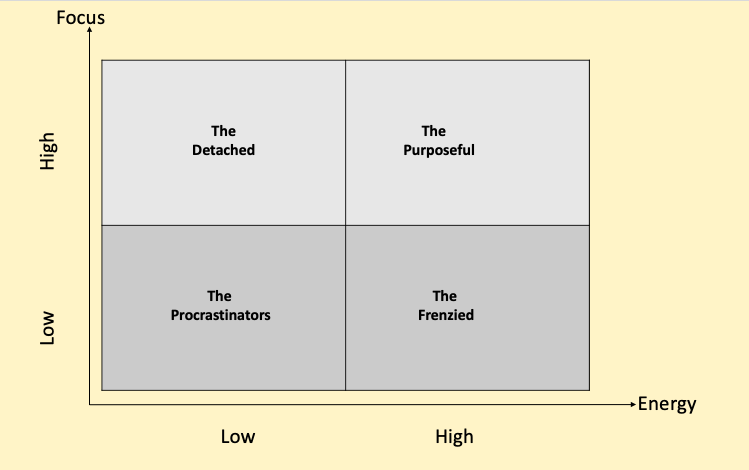These are not the best of times. There is all around the news of Covid’s impact out there.
Now the natural tendency during these times is to start feeling anger, victimhood, and blame everything from politics, government, etc!! The moment these negative feelings, no more we want to be involved in productive work!! Then inaction creeps in.
But we do see people who thrive even in this midst of gloom and doom environment. What is the secret that separates thriving people from the rest?
Dale Carnegie explains it perfectly…
“Inaction breeds doubt and fear, action breeds confidence and courage, if you want to conquer fear do not sit home and think about it, go out and get busy.”
Of course, now we can’t go out and get busy during these lockdown times :), but the key message is to keep oneself in action and not let doubt and fear breed!!
Doubt & fear result in loss of focus and energy.
As you can see in the 2X2 matrix the behavior exhibited with respect to energy and focus.

So, how does one can overcome this level of negativity, low focus, and energy to gain clear focus, and marshal energy towards being more purposeful and productive?
There are 3 steps that help as per the Book A Bias for Action from Sumantra Ghoshal, Heike Brunch!
Define your goal
Losing focus means we tend to stop working towards the goals we have set for ourselves. We even end up getting doubts such as,
- Is the goal I have set really matter anymore?
- Is this workable during these times?
So it is important to get over the doubts and revisit the goals. Because well-defined, challenging yet realistic goal setting can have an enormous energizing effect.
So, time to revisit some of the goals set goals and to make it a more energizing act, ask yourself
- Do I need some help like a mentor, coach to help me see the big picture?
- Do I need more information or should I join some seminars or workshops to learn the strategies?
- Can I do research to gather additional data to define my goal more clearly?
- Is my goal well defined and concrete? Is it aligned to my value and those of my business?
if you want to learn more about outcome-based goal setting, you can read my article here
Increase your confidence level
Confidence must follow competence. Many times the confidence takes a beating because we were overconfident. This is called Dunning-Kruger Effect.
These are the times that teach humility is a great virtue and let the confidence grow along with competence. How to do that?
Ask the following questions.
- What experience with achieving comparable goals or similar challenges have I made earlier? Can I do it again?
- What role model or whom can I approach who can help me to understand what it actually takes to achieve the goal?
- Who can give me feedback and help me evaluate whether I have the capabilities to achieve my goal? What abilities do I have and what is required to learn to become sure that I succeed.
- What kind of pilot projects or experiments I must do to help me understand the critical tasks required to really achieve the goal?
Overcoming negativity and developing positive thoughts and feelings
Our state of being is all about what we feel day in and out. So it is important to know what kind of feeling do we harbor? Are these right positive feelings or negative ones?
Keep asking yourself multiple times a day or few times a week,
- What emotions do I harbor and what triggers them? For example, am I feeling low, due to triggers caused by watching news, social media?
- Should I change my tasks or goals so that my work is less stressful? Ex, is attending all meetings a must?
- What habits should I really break or what habit should I develop? Ex: Can I develop the habit of journaling or music, gardening, etc?
- Do I have regular healthy outlets – hobbies, friends, for these positive feelings?
- What about my work? Does it create enthusiasm, excitement, and fun in me?
- Am I doing what I really love doing?
- How can I consistently leverage emotions positively at home, work?
- What kind of activities do I enjoy and what environment do I need to create to-do those activities?
- Whom do I like working with?
- Apart from work, family, what is that personal reservoir from which I can regularly draw for balance or strength? The personal reservoir is your own willpower, habits, values you can rely on when you want balance and strength.
As said, being in action is the key to overcome any adversity. One must avoid letting doubt, fears creep in that leads to inaction. Bias for action is the biggest quality one can practice.
